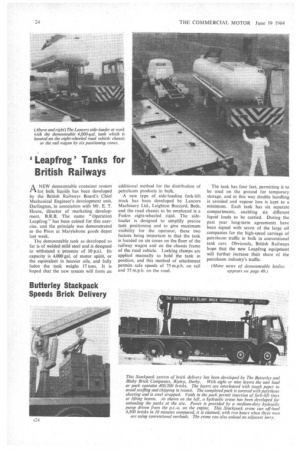Leapfrog Tanks for British Railways
Page 26

If you've noticed an error in this article please click here to report it so we can fix it.
A NEW demountable container system ri for bulk liquids has been developed by the British Railways Board's Chief Mechanical Engineer's development unit, Darlington, in association with Mr. E. T. House, director of marketing development, B.R.B. The name "Operation Leapfrog" has been coined for this exercise, and the principle was demonstrated to the Press at Marylebone goods depot last week.
The demountable tank as developed so far is of welded mild steel and is designed to withstand a pressure of 10 p.s.i. Its capacity is 4,000 gal. of motor spirit, or the equivalent in heavier oils, and fully laden the tank weighs 17 tons. It is hoped that the new system will form an additional method for the distribution of petroleum products in bulk.
A new type of side-loading fork-lift truck has been developed by Lancers Machinery Ltd., Leighton Buzzard, Beds, and the road chassis to be employed is a Foden eight-wheeled rigid. The side. loader is designed to simplify precise tank positioning and to give maximum visibility for the operator, these two factors being important in that the tank is located on six cones on the floor of the railway wagon and on the chassis frame of the road vehicle. Locking clamps are applied manually to hold the tank in position, and this method of attachment permits safe speeds of 75 m.p.h. on rail and 55 m.p.h. on the road. The tank has four feet, permitting it to be used on the ground for temporary storage, and in this way double handling is avoided and vapour loss is kept to a minimum. Each tank has six separate compartments, enabling six different liquid loads to be carried. During the past year long-term agreements have been signed with seven of the large oil companies for the high-speed carriage of petroleum traffic in bulk in conventional tank cars. Obviously, British Railways hope that the new Leapfrog equipment will further increase their share of the petroleum industry's traffic.




















































































































